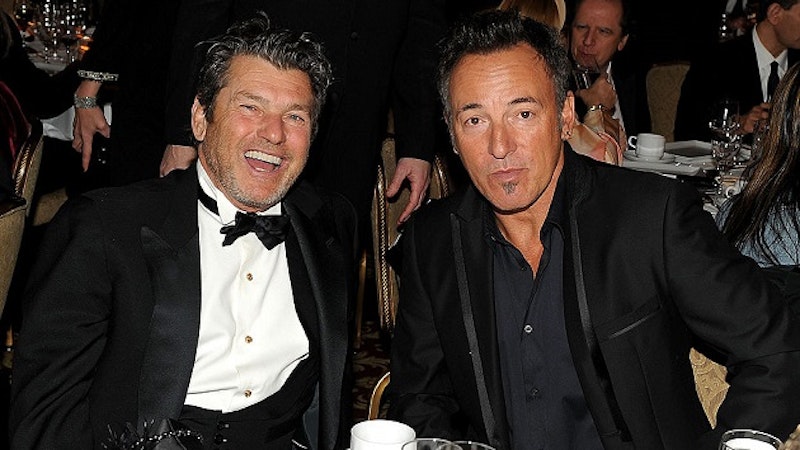The instantaneous, and incendiary, reaction to David Marchese’s New York Times interview with 77-year-old Jann Wenner in advance of the Rolling Stone co-founder’s upcoming book, The Masters—seven interviews with his pals—surprised me. Wenner, always a bombastic, narcissistic combination of Bill Clinton and Donald Trump, was indelicate in comments about women and black rock/soul/pop stars, saying they weren’t as “articulate” as his heroes like Mick Jagger, Bruce Springsteen, Bob Dylan and Bono (!). It was a half-Biden gaffe, I’d say: he wasn’t thinking about how the ugly comment would play with people interested enough to read about him; and it’s probably how he really feels. In old-school journalese, that’s called a “Kinsley gaffe.”
Wenner’s punishment—aside from joining the ranks of the cancelled—was his swift removal from the Rock & Roll Hall of Fame Foundation, which he helped (and was the public face of) start in 1983. Big deal. The Rock Hall was always a sham, a clubhouse for music artists that met with Wenner’s approval, and I never took it seriously. Just as Major League Baseball’s Hall of Fame will never have credibility until it inducts the late Curt Flood, who, along with labor leader Marvin Miller, was most responsible for the lucrative contracts that players receive today—many of whom have never heard of Flood—the Rock Hall is sullied by the inclusion of schlocky hit-single machines Billy Joel and Neil Diamond.
The now-widespread denunciations of Wenner—as a shameless starfucker from the very first issue of Rolling Stone, he always was the butt of jokes—strikes me as strange. Not that his putdowns of black and female artists as “inarticulate” made much sense and were vile, but where was the condemnation last year when the Times’ Maureen Dowd—an “articulate” woman, despite her batty political views—traveled to Wenner’s Montauk home to eat lavishly and then write a long softball piece to promote her subject’s awful autobiography Like A Rolling Stone. (I made the mistake of agreeing to review the interminable self-toast for The World Spectator; rarely has reading a book been so torturous.) I suspect that Dowd liked the caviar, black sea bass and rose she was served more than Rolling Stone when it was vital American magazine (roughly from its inception in 1967 to 1976, when Wenner chased after Jimmy Carter and his staff from the publication’s new offices in Manhattan, led me, an early and ardent fan, to remove RS from can’t-wait-to-read to if-I-get-around-to-it status), if she ever bothered to read it.
Dowd had no questions for Wenner, in detailing his career, about his magazine’s scanty coverage of women and black artists, and in retrospect I’d have thought the cancel jackals would’ve pounced then. That’s a demonstration of modern journalism: you never know when the social media storm will hit. Wenner’s remarks to Marchese were the most pointed, but his musical preferences and preferred treatment have never been a secret. (It’s completely in Wenner’s nature, but I was still taken aback that he allowed John Lennon to edit the two-part interview Wenner conducted with him in late-1970. Didn’t really matter: Lennon was in top form, blasting The Beatles and Paul McCartney, making for a very juicy read when I was 15 and still pissed that the band broke up.)
Let’s also remember that Rolling Stone—which included writers like Hunter S. Thompson, Joe Eszterhas, David Dalton, David Felton, Tom Wolfe, Timothy Crouse, Greil Marcus, Howard Kohn and Lester Bangs—was, from its start, geared to white readers, Boomers like Wenner, and mostly male. In the same vein, will contemporary moralists attempt to erase Hugh Hefner’s Playboy, the extraordinary Esquire of the 1960s, and The New Yorker, all geared to white and, again, mostly male readers? Does Ms. magazine get a pass because it was an early feminist publication? What about the Village Voice in its most influential years, which included few female writers? You could, if so inclined, go on all day consigning once-classic magazines to the category of statues of Robert E. Lee, Stonewall Jackson, Andrew Jackson, Thomas Jefferson and Christopher Columbus. Joe Hagan, author of the 2017 Rolling Stone biography, Sticky Fingers, a good and complete read, has taken to Twitter saying that Bruce Springsteen should speak up about Wenner’s current mess, and as of this writing—Wednesday at noon—the wealthy populist hasn’t done so. Will “The Boss” feel any backlash?
I don’t have the patience to follow the story any longer.
The beginning of a (two-byline) story in The Washington Post on Sept. 18 is typical of the killing-a-minnow-with-a-nuke frenzy over Wenner. “Jann Wenner spent 55 years building his legacy as a media entrepreneur, godfather of New Journalism and tastemaker for the baby boomer generation. It took a single interview for him to throw a good deal of it away.” I’ve never heard or seen Wenner described as the “godfather of New Journalism” and though I was a subscriber the mercurial, and ever-gauche, the Rolling Stone editor was definitely not a “tastemaker” for this boomer. He established a great and (for a time) influential music and pop culture publication; and was smart enough to know it was right time to do it, succeeding where predecessor Crawdaddy failed. That’s a “legacy” that can’t be erased. Forgotten by today’s readers, but so is A.J. Liebling.
—Follow Russ Smith on Twitter: @MUGGER2023

